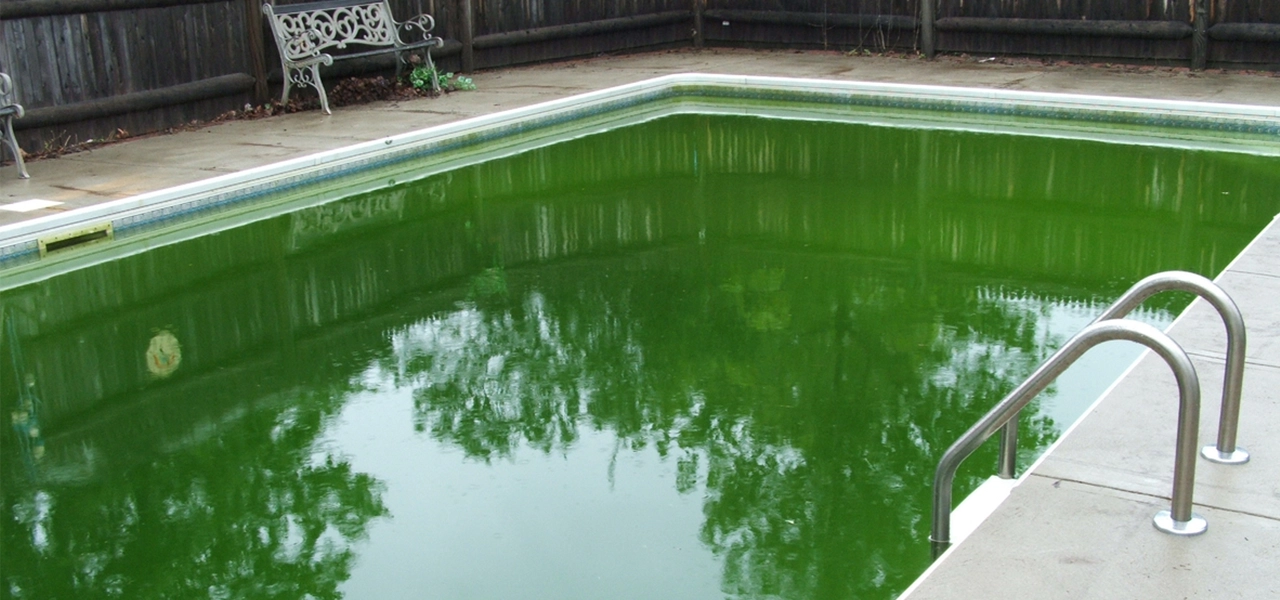FREE Standard Shipping On All Orders $100 or More!*

Don't Close Your Pool Green!
Getting your pool in shape for closing is a great way to ensure an easier pool opening and protect your pool during winter. And while there are many situations to avoid when closing your pool, the most important one is to never close your pool when it's green. A green pool only means one thing — algae! In this article, we discuss the common myths surrounding closing a green pool, and how to properly resolve the problem.
Myth #1: The pool cover will block out light and kill the algae.
Closing a green pool with algae, or dirty with debris, or with unbalanced water, leads to heavy staining and saturation of the water with dead algae cells, which makes it easier for subsequent generations to grow. Many forms of pool algae can grow accustomed to low light, and some can substitute aqueous starch or sugar, to acclimate to complete darkness.

Myth #2: Cold water will kill the algae during winter.
Algae becomes dormant at low temperatures, and the rate of photosynthesis and growth is very low once temperatures drop into the low 60s. It's for that reason that we have suggested to wait until your pool water temperature is 65°F before closing the pool.
Algae growth is stopped at temperatures below 40°F, but some algae can continue to survive, and like weeds in a lawn, can go dormant over the winter, coming back to life in early spring, weeks before you open the pool.
Myth #3: I shouldn't have to clean the pool twice during close.
Why clean it now, and then again when you open? Two reasons - leaves, debris, dust and dirt mixes with salts and minerals in your pool and can make ugly stains during a long winter without circulation. Secondly, any organic matter in your pool uses up the winter chemicals quickly, leaving no reserve for springtime.
Myth #4: I can just drain the pool when I open.
For concrete pools that are going to be drained and acid washed next year anyway, or if you are certain you'll replace the pool liner in the spring - then you may think it quite clever to close the pool green, and without any winter chemicals. However, excessive algae growth from high pH and low sanitizer can damage pool plaster or steel pool walls, and other underwater pool materials.
Myth #5: I can just drain the pool now and leave it empty.
All swimming pools must be kept mostly full during the winter to prevent damage to the walls or popping of the pool from hydrostatic pressure. It also protects plaster from cracking and vinyl from shrinking.
Myth #6: I don't have time, I have to close the pool now.

If it's urgent that you close the pool without the water being clear and balanced, and the pool spotlessly clean, this happens sometimes. In addition to winterizing the pipes, or filling them with pool antifreeze, take these steps as a minimum:
- Lower pH to 7.2, brush and skim to distribute
- Shock the pool or add a winter chemical kit
- Cover the pool tightly to block out leaves and sun
Green pools should always be covered for safety reasons. Uncovered green pools are more hazardous, as the floor of the pool is not visible. A safety cover is the best type of pool cover for winterizing, or for protecting a pool that is not regularly maintained, due to lack of funding or an empty house.
In the long run, closing a pool green or filled with debris will create more work and could permanently stain or damage surfaces. Protect your pool with clean and balanced pool water, a winter kit, and a strong pool cover!